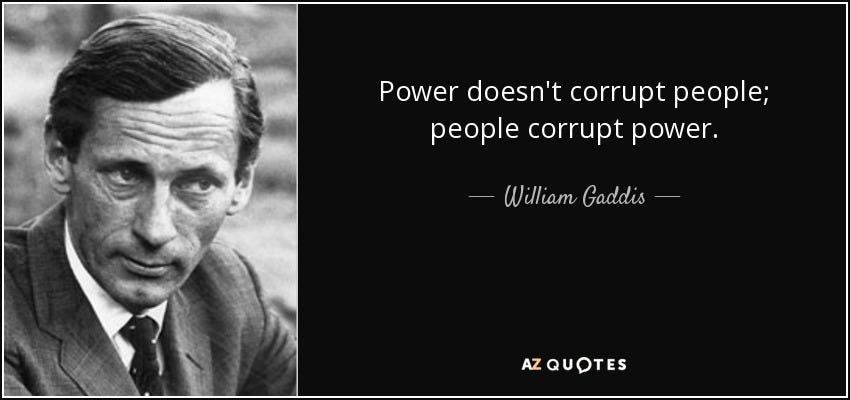We’ve long been aware of the relationship between holding power and the decline into corruption. Most commonly this is observed in the holders of political office. We have a tendency to believe that such politicians were always corrupt and sought office because the lure of power drew them. This is only true to a very small degree.
What you probably already know
What the possession of power does is it taps into existing propensities and slowly eats away any inauthentic character aspects like a rust. For the most part, people who have been corrupted by power entered their position of power with genuine ambitions. However, like most of the human race, they haven’t developed their character and grown it to match the growth in the status they have achieved at a societal level.
It should also be noted that, like rust, the descent into corruption caused by the possession of power is a slow and gradual process. This means that very often those who are subject to this decline are oblivious of it as it happens by degrees, their own perception of what is right and fair, or even normal, becomes distorted in the process. They lose their sense of perspective and objectivity.
Politicians are given privilege, treated as special, with the world revolving around them. The wealthy also are beneficiaries of this treatment, as are the famous. But, as you can no doubt see, it is when a person’s ego and identity becomes confused and entangled with the possession of an external status that things go awry.
The especial treatment is because the fawning supplicants seek to gain something from the power of the status they flatter. The person who holds that status is only incidental to their objective. From politicians they seek some legal benefit. From the wealthy, they seek to share in their money. From the famous, they seek a reflective fame of their own.
Let’s get personal
What bought these thoughts to my mind was an observation I made in relation to social media. I have an account on Twitter for my business, specifically focused on financial markets, so I have observed this behavior in the subset that refers to itself as “FinTwit”. Over the years I had noticed that as accounts grew their following - typically beyond 10,000 - more often than not the accounts would drift from their original content and intent. Most of these accounts initially produced good content, which is why they got a following in the first place. Once they got more followers this generated a momentum of its own - people tend to follow the accounts that those they follow follow. Follow? And as their number of followers increased, they also began to interact more with those who held similar numbers of followers, like being accepted into a status-based club. Seriously, some of the sycophantic mutual rapport building between these accounts when they first achieve their new ‘in the club’ status, but are still insecure about it, is sickening. Anyhow, inevitably these social media accounts generate more “noise” and less quality. They increase their banter and baiting whilst reducing their analysis. Essentially, they devolve from producing interesting and quality content into a quasi-fame forum that feels the need to perform for their followers, producing a constant stream of posts.
NOTE: As the shutdowns resulting from Covid-19 forced people to socialize online, this behavior has become more obvious. The dilemma for me is that I now want to unfollow accounts that I have followed before their rise in status. Some I have cut, but others I know are capable of producing good and unique work so I still follow them, trying to ignore the noise, just in case they post something worthwhile once more.
Are you corruptible?
Ask yourself. Would you (have you?) change(d) the content of your social media accounts based on your following? Would you let the crowd or your new status change you and your expression? Maybe changing is legitimate in some circumstances as market feedback can help shape services, but the stuff I’m talking about takes away from what once was quality as it begins to feed off a degree of fame.
How can you counteract this human propensity toward corruption? Develop your inner self (personal growth) at the same rate that you develop your external self (societal status). Grow your internal person so that it can sustain the growth in your external achievement and circumstances. Think of it like the roots of a tree, which must be able to feed the tree whilst also supporting the tree against the elements, otherwise the first strong wind will topple it and all its growth will have been in vain.
What you do internally is for you, but others also benefit. What you do externally is for others, but you also benefit.




